Can Brazil Be Saved?
Colossal corruption. Political chaos. The worst recession in its history. The Olympics won’t rescue the once-booming nation. But all is not lost.
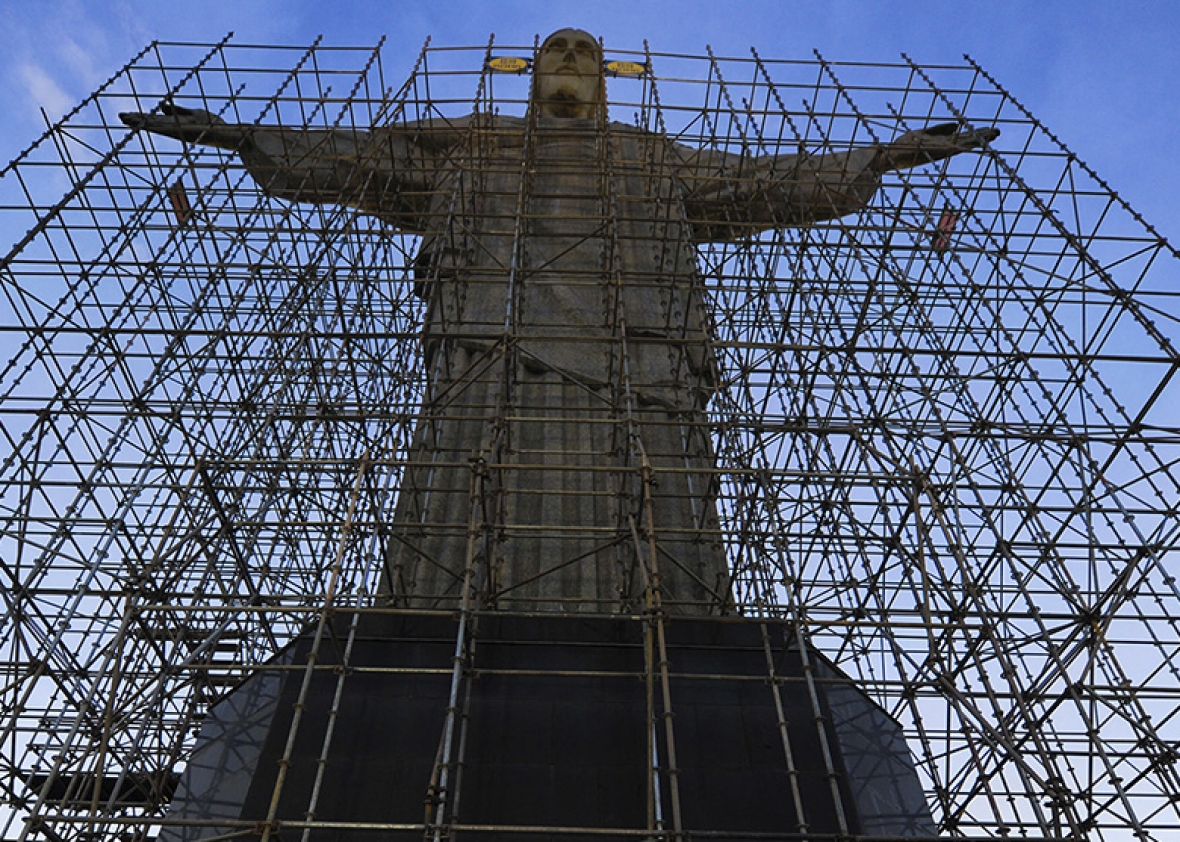
Antonio Scorza/AFP/Getty Images
RIO DE JANEIRO—These Olympics should have been the triumphalist coda to the Obama era. That was an inevitable reverie for the red-eye flight that carried Barack and Michelle to Copenhagen in 2009, when they invested their full prestige in a last-ditch push to plant the 2016 games in Chicago. Even though he would win the Nobel Peace Prize a week later—at the moment, he still served as the unblemished proxy for the world’s highest hopes—Obama failed in this highly personal mission on behalf of his city. His defeat came at the hands of a tiny, bearded man, with cherubic dimples and an amputated pinky, who cried upon hearing the news of the game’s ultimate destination.
President Luiz Inácio Lula da Silva—Lula, as the back of his soccer jersey might proclaim—was determined to elevate Brazil to the rank of great nations. Though he came from a confrontational wing of the labor movement, he governed in a conciliatory style that rallied his country behind his grand projects. Lula dragged tens of millions from absolute poverty in an astonishingly compressed stretch of time. With the beneficent assistance of the state, Brazilian industry flourished on a global scale, with its masters of commerce and finance suddenly populating the list of the planet’s billionaires. During his eight-year term, from 2003 to 2010, Budweiser, Heinz, and Kraft—the stuff of the American cookout—would come to be owned by Brazilian private equity funds and conglomerates. Lula had old-fashioned ideas about national greatness. A country could be measured by its infrastructure—its ports, dams, stadiums—and the mega-events it hosted. When the International Olympic Committee handed the games to Rio de Janeiro, Lula proclaimed that the world had finally recognized Brazil as a “first-class country.”
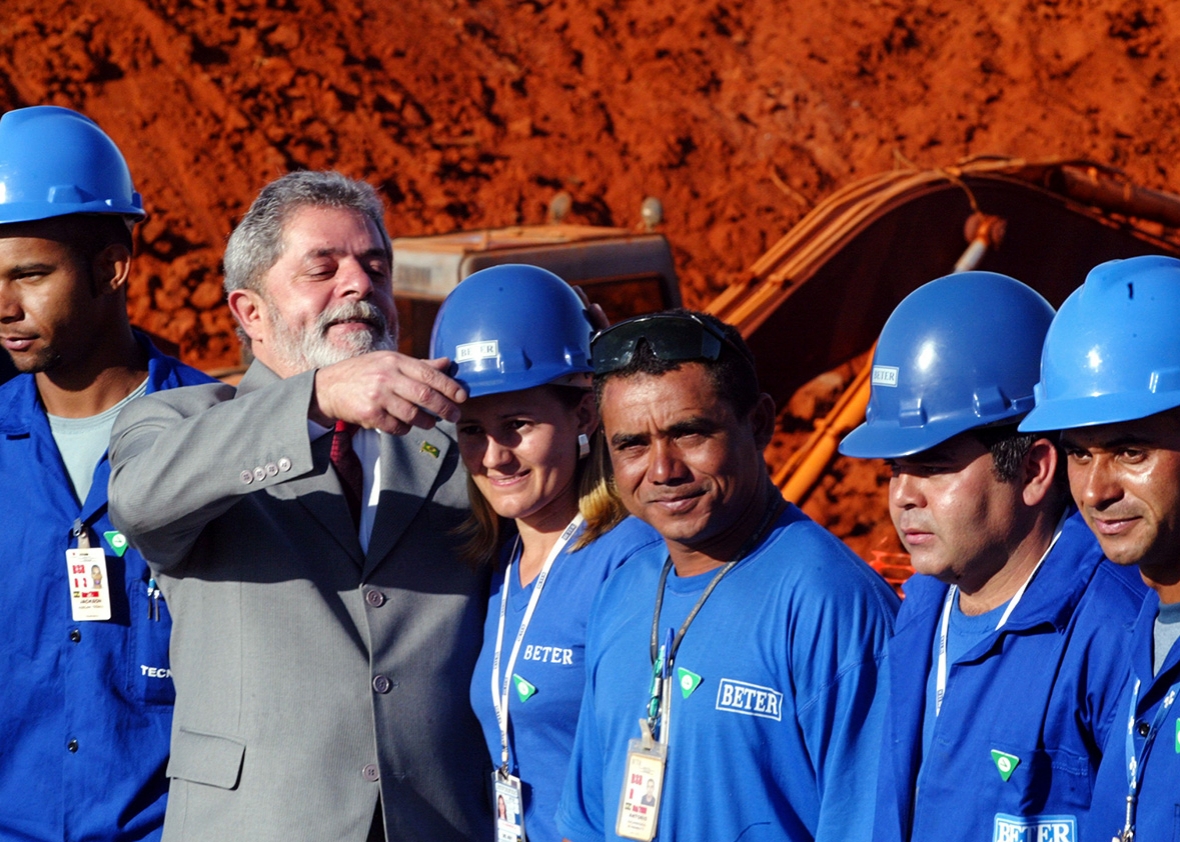
Jamil Bittar JB/TZ/Reuters
Such proclamations of grandeur now feel delusional. Less than a week before the start of the games, a court formally charged Lula with obstruction of justice—accusing him of stymieing an investigation into the corruption of the state-owned oil company, a case that implicated him and just about everyone else in the country’s political system. His handpicked successor to the presidency, Dilma Rousseff, will skip the games entirely. The loneliest woman in the country, she may or may not watch as she sits in the Palácio da Alvorada in Brasilia, stripped of her authority as she awaits the final verdict of the congressional impeachment proceedings against her.
Everything in Brazil feels broken now. Dilma’s impeachment was a farce, if only for the fact that her accusers have benefited from graft on a mind-bending scale and ginned up the spectacle to distract from their own misdeeds. The Brazilian congress is a house of malfeasance. According to Transparency International, more than half its members face prosecution, many for raiding public coffers, some for kidnapping and murder. When interim president Michel Temer assumed Dilma’s job in May, he immediately shed three Cabinet ministers to scandal, including the minister charged with fighting corruption.
Political dysfunction—about 1 percent of the gross domestic product disappears in the form of wasteful corruption—is deeply implicated in the country’s exploding economic crisis. And that crisis is terrible by any measure. “Brazil is suffering its worst recession since the 1930s, perhaps of all time,” the Economist has declared. The country’s GDP is 5.4 percent smaller than it was last year at this time. Many of the magnificent advances of the Lula era have dissipated in this collapse, including the optimism his presence once elicited. More than half of the residents of Rio—the city buffed up and built out for the big show—tell pollsters that they would rather live somewhere else.
Despair is an understandable reaction to this mess. If we stare deep enough at Brazil’s many problems, however, they begin to change shape. When I visited Rio, on the eve of the Olympics, to meet with the country’s leading intellectuals, economists, and political analysts, I found a curious stirring of optimism. The contrails of the convulsions reveal achievements sturdier than the ephemeral commodities boom that fueled Brazil’s decade of caffeinated growth. There’s a degree of wishfulness here, since any advance will hinge of taming the very forces whose existence form the spine of modern Brazilian history. But there’s a chance that the recent convulsions—so ugly and painful in the moment—will eventually bring the country to a better place, less prone to the cycle of ecstatic booms and apocalyptic busts, with an ultimately sounder democratic footing.
* * *
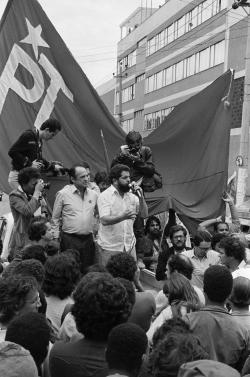
Getty Images
Brazil is a country largely resistant to ideology. This is a strange fact given its founding by followers of the French philosopher Auguste Comte, who inscribed an epigram from his philosophy of positivism in the national flag: Order and Progress. Yet ideology implies sharp, polarizing ideas—and those bend and melt in the Brazilian system, which prods the country toward sublimating its divisions in rough consensus.
In the aftermath of raucous metalworker strikes in the late ’70s, Lula helped create the Workers’ Party, the Partido dos Trabalhadores, or PT. It was the world’s only labor party founded in the postwar era. On the surface, it seemed to break with the tradition of consensus-minded politics. For a time, Lula’s party chanted the mantra of the Latin American left. It promised to nationalize banks and default on foreign debt. That turned out to be just talk. Although Lula liked to surround himself with intellectuals, he was hardly one himself. Indeed, his direct, unpretentious style is the source of his oratorical force. In the end the theoretical basis for the party, the wellspring of its policies, was Lula’s own personal experience.
Born to an alcoholic father, who sired 22 children spread over families in two different cities, Lula joined the great wave of migration from the rural north to the industrial south. By the age of 14, he was working in an auto parts factory in one of the gritty suburbs that form a collar around around São Paulo. Lula felt loyalty to his class but never viewed its existence with any sentimentality. He would chide his intellectual friends who spoke lyrically about the overalls of the worker: Lula aspired to wear suits. What he wanted was the dignity that comes from material possessions. As he put it, “I worked my whole life and could never afford a car. What I want is for people to have cars, I want people to buy motorcycles, I want people to buy fridges and washing machines.”
It took Lula four separate bids to win the Brazilian presidency. If you ask most commentators about why he ultimately prevailed, they will reply, “It was finally time.” By which they meant, Lula had sanded down his ideological edges and finally won the grudging confidence of the elite. Lula advertised the fact that he no longer threatened to upend capitalism. He signed a letter to the Brazilian people that essentially assured continuity with the careful market-pleasing fiscal policies of his predecessor, Fernando Henrique Cardoso. With his newfound respectability, there was no longer any plausible reason to keep the country’s lumpenproletariat from assuming the political power it deserved by dint of its numbers.
Just because he no longer threatened to upend capitalism doesn’t mean he discarded his lifelong commitment to the lowest rungs of Brazil’s working class. As a society, Brazil tended to underestimate the historical weight of race. To take a glaring example, 1 in 6 women in the Brazilian workforce are maids, almost all darker skinned than their employers. As people like to joke, even maids have maids. These maids enter apartments through separate entrances, ascending through separate elevators. Many spend the workweek living in these apartments, stashed in a tiny room off the kitchen. For an outsider, it’s hard to escape the racism at work—workers with separate elevators and doors.
With the retrospective taint of corruption, Lula and Dilma fail to get full credit for their ambitious effort to reverse this condition, to provide the poor and working poor with dignity that society never really afforded them. Long before Silicon Valley began waxing enthusiastic about the idea of a guaranteed minimum income, Lula implemented a program called Bolsa Família. A poor family can receive a meaningful monthly stipend if it proves that it has vaccinated its children and sent them to school. (And unlike so many other aspects of the Brazilian state, the program was administered mechanically, without corruption.) During Lula’s first term, poverty fell by 28 percent. All the metrics for income inequality showed a remarkable closing of Brazil’s yawning gap between rich and poor.
But Lula’s program wasn’t fundamentally about the redistribution of wealth; it was about the redistribution of status. There were good reasons for the poor to feel they’d been denied the fruits of citizenship. With a good lawyer, the rich could exploit a lengthy appeals process to escape punishment for the worse crimes while the police meted out justice in the favelas with a harshness and capriciousness familiar to black Americans. Over the past decade, police have killed 8,000, mostly black men. (The Brazilian war on drugs is no more of a shining success than the American one.) Lula engineered a new sense of social inclusion. When he arrived in Brasilia, his Cabinet included three black ministers, an unprecedented integration of political power. João Moreira Salles, the publisher of Piauí magazine, followed Lula for a documentary about the campaign that finally brought him to the presidency. He recalls the emotional outpouring that greeted Lula’s arrival in the poorest neighborhoods: “Everyone was crying, because we the downtrodden had reached power.”
Lula geared the economy to provide the working poor with the goods he had once craved himself. He used the state-run bank to loosen credit, and subsidies encouraged the purchase of cars and homes. Where banks hadn’t trusted the poor, he implemented programs that allowed banks to extract interest payments straight from paychecks. Lula’s vision of a fridge in every home came close to fruition. Favelas without roads and sewers connected to the internet; Brazilians came to own more cellphones per capita than any nation in the world. This new consumption power helped to remake Brazilian culture. With their new buying power, the working poor attracted the attention of advertisers. Telenovelas were no longer lily-white productions but featured actors who reflected the lower rung of society back to itself. Luiz Eduardo Soares, an anthropologist and public intellectual who has written beloved books about Rio, joined Lula’s Cabinet and then fell out with the president. Despite his criticisms, he’s emphatic that “the thrust of Lula’s program, especially affirmative action and his appointments, created a new sense of citizenship among the working class and poor.”
This program had glaring faults, and these faults contributed to the current crisis. All those new cars and washing machines felt good, but they were less life-changing than Lula imagined—and sometimes they inadvertently changed life for the worse. New cars clogged the megalopolises; the government hadn’t thought to invest in the roads and mass transit that might manage the increased vehicular volume. And the toll of traffic fell hardest on the working poor, who suffered increasingly elongated commutes from their homes on the geographic fringes of economic life. Two- or three-hour journeys to work, inching through congestion, are commonplace—and brutal when paired with a return trip at the end of the day. When the mayor of São Paulo wanted to increase bus fare by 21 centavos in 2013, the country erupted in the largest mass protests in its history. It wasn’t a dramatic hike—just nine cents—but a perfect symbol of the increasing burdens on the working poor, forced to fend with an inadequate system, insensitive to their plight.
This notion of congestion didn’t just irk the poor—it fueled a backlash among the upper middle class and elite. They complained about crowding at the airports, which could be read as griping about having to share lines with people who suddenly had the wealth to travel by air for the first time. Affirmative action was met with resentment. Commentators published tomes that decried the government’s assault on meritocracy. All the new protections for maids exploded in clueless complaints about unjust impositions. These resentments never mattered much while the economy was booming. But after the commodity markets collapsed and the country rushed in the direction of fiscal crisis, these festering gripes would ultimately fuel street protests—this time braying for the end of PT rule, the impeachment of the president.
Elite panic changed shape over time. A year before Lula arrived in office, markets sank at the likely prospect of his arrival in power. The widely voiced anxiety was that he might steer the country in a Cuban direction. But his defining tendency wasn’t his radicalism. He largely accepted the economic and political system he inherited. Brazilian business never had a better friend, which provided the basis for growth but also corruption. His accomplishments are monumental. His legacy falters on the things he left in place.
* * *
In the presidential bedroom, in the palace designed by the architect Oscar Niemeyer, Dilma Rousseff used to sleep with her shoes on, according to a profile in Piauí. And she has confessed that she keeps cash tucked under the mattress there. As a student, Dilma had joined an underground revolutionary cell seeking to overthrow the military dictatorship, a fugitive life that kept her in constant motion, always fearful of moles and inadvertent betrayal. Inspired by Che Guevara—with some of its leaders trained in Cuba and North Korea—the resistance staged bank robberies, kidnappings, and worse. When the dictatorship arrested Dilma in 1970, she carried a gun.
Military dictatorship began in 1964, far earlier than in Chile or Argentina. It committed terrible crimes—it murdered or disappeared 379 of its opponents, though that estimate varies—but it also modulated itself, relative to its peers, and therefore survived for an impressively long span. (In Argentina, by contrast, the dictatorial death toll was 9,000.) It was Dilma’s misfortune to be arrested at the peak of the regime’s brutality. The regime attempted to inflict maximal psychic damage—for three years, she suffered torture by rodents, electric cattle prods, and paddles. After a uterine hemorrhage, her bleeding softened the hearts of her tormenters enough to win her a day’s reprieve. She was subjected to a torture device called the parrot’s perch—hung upside down, naked, with her arms and ankles bound. Politics isn’t a solitary exercise; yet, life underground and the years of torture left her suspicious and stubbornly self-dependent.
Perhaps she has good reason for suspicion. Lula encouraged her to seek the highest office in the land, then bestowed his popularity upon her candidacy, even though she was far from the obvious choice. She had served as his chief of staff, a largely managerial position that left her barely exposed to the public. It is commonly said that Lula picked her for vain reasons. He believed that Dilma would continue to treat him as the boss, and when he planned his inevitable return to the presidency, she would make way for him. It was a power dynamic displayed in their salutations. While she continues to address Lula as “sir” or “Mr. President,” he never reciprocates the formalities. Despite her high office, Lula would simply call her “Dilma” or “Dilminha.” When questions arose about the preparedness of his protégée, Lula would say, “Calm down. She’ll change. This chair changes people.” Later, as she stood on the precipice of failure, he privately recanted that promise. “Even that chair wasn't enough,” he lamented.
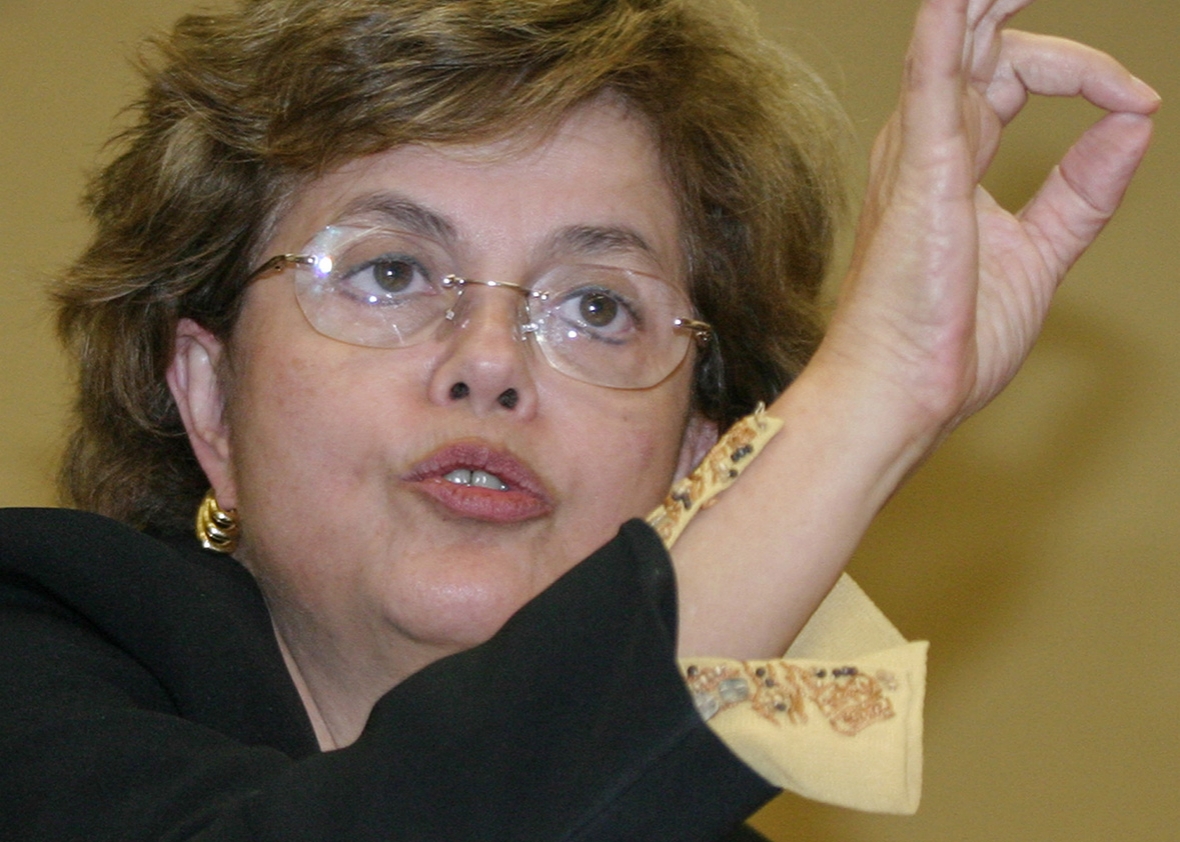
Jamil Bittar/FILE JB/GN/Reuters
Dilma’s personal style is distrustful, but she can be coolly pragmatic. She launched a reconciliation commission to publicly address the crimes of the dictatorship, but she never dealt harshly with supporters of that regime. In that way, she fit the Brazilian pattern. In the ’80s, the country accepted a prolonged, negotiated transition away from dictatorship. There was no rupture, no cathartic moment separating the two epochs in Brazilian history. Still, it was striking to see Dilma, of all people, get along so well with representatives of the ancien régime. The past remained shuttered away, even if it disturbed the president’s sleep.
Though Dilma would never put it this way, there was a common idea uniting the PT with the dictatorship. They shared a theory: desenvolvimentismo, or developmentalism. The doctrine holds that a strong state can build a strong economy. The state would impose high tariffs to protect domestic industries. And it would provide subsidies and cheap credit to create new firms. The government would spend meaningfully on massive projects that would bring remote regions of the country into the modern world.
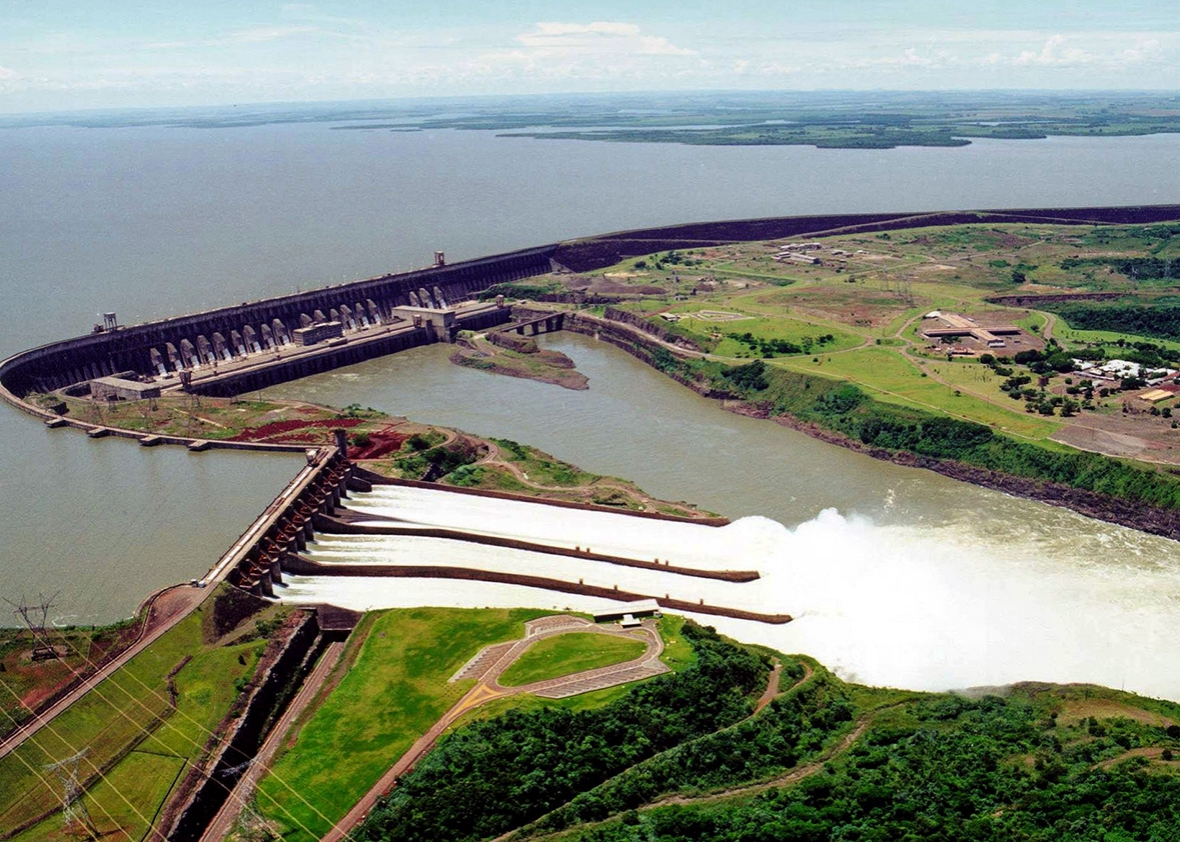
Reuters
During the dictatorship, the fruits of developmentalism were impressive. The government created Embraer, which became an aeronautical behemoth; it bankrolled the birth of an ethanol industry so that Brazil could reduce its dependence on foreign oil. The dictatorship built the gigantic Itaipu Dam on the border with Paraguay and the eight-mile bridge connecting the cities of Rio and Niterói. These projects spurred years of incredible growth—an annual average of 11 percent between 1968 and 1974. It was deemed the “Brazilian Miracle.” But the spending also caused debt to pile and inflation soon plagued the economy.
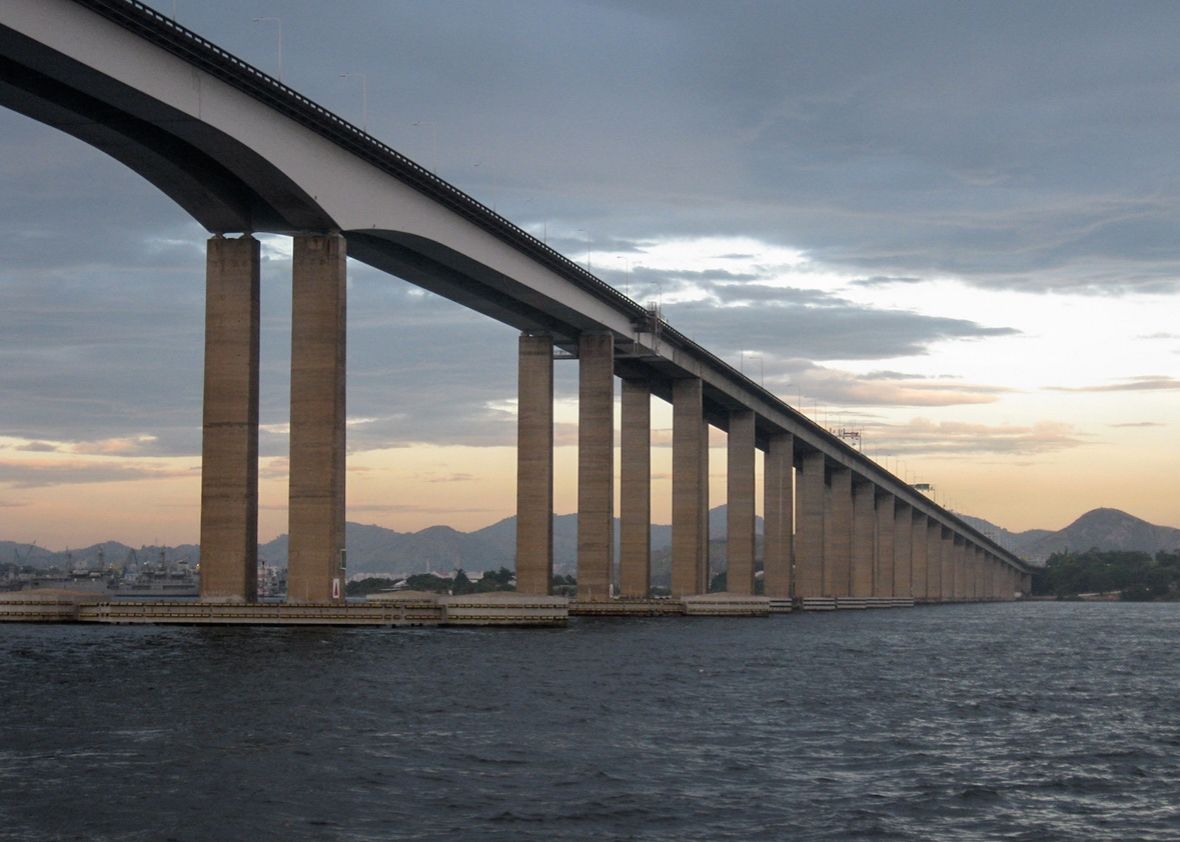
Jorge Andrade/Wikimedia Commons
The dictatorship made a handful of men very rich. It handed lucrative contracts to the country’s biggest construction companies. Laws buffered these companies from international competition and provided them with handsome tax breaks. As Alex Cuadros writes in his excellent new book Brazillionaires, “Some have called Brazil ‘republica das empreiteiras’—republic of the construction firms.” In returns for these handsome profits, the construction companies sponsored special projects for the dictatorship. One of these was Operacao Bandeirante, OBAN—the secret unit, funded by private donations, to stamp out the fledgling insurgency. It was the unit that tortured Dilma.
Some of the same construction companies that underwrote her torture made a fortune from her presidency. Lula and Dilma reprised developmentalism—even hiring Delfim Netto, the economic guru who helped the dictatorship orchestrate its miracle. The motive was the same as ever: to use concrete and steel to build Brazilian greatness, a vision of self-sufficiency and state-directed growth, with government and business working hand in glove. When I visited Marcos Lisboa—an economist who worked for Lula and now runs a graduate school in São Paulo—he recalled, “Lula had this dream of Big Brazil. Everything had to be the biggest in the world.” Just as they hatched Bolsa Família, Lula and Dilma were credited with creating a Bolsa Empresário, a massive transfer of wealth to big business. As Cuadros notes, “In 2009 [Brazil’s state development bank] lent out seventy-six billion dollars, more than the World Bank lent out in the entire world.” In return for the prime gigs, the construction companies funneled money into PT campaigns. By one estimate, half of PT contributions originated with these construction firms.
Much of PT’s developmentalist approach seemed severely misguided and obviously atavistic to economists. Lula ordered the invention of a shipping industry from scratch, an expensive endeavor that sought to gain on competitors centuries ahead of his country. When Brazil won the World Cup, it built a giant stadium in the Amazon that was never likely to be used again, at least not on the scale of its design. Brazil is strewn with ruins of projects—refineries, power plants—begun but never finished. Most of this investment never landed in places or industries that really meshed with the trajectory of the global economy. This wasn’t state-of-the-art industrial policy. The projects seemed curiously nostalgic.
Still, developmentalism seemed a plausible strategy, so long as the export of commodities furnished the treasury with ample revenue. Brazil even managed to grow through the financial crisis of 2008 that battered the rest of the world. This seemed like confirmation that Brazil was experiencing a second coming of its miracle, the sort of growth that defied the laws of classical economics. The magic, however, wore off. China, with it insatiable demand for raw materials, slowed. The price of oil, which had been discovered off the Atlantic coast and explored at massive costs, dropped in world-historic fashion.
Instead of acceding to these new realities, Lula and Dilma resisted them. They doubled down on their economic strategy. Credit, already loose, further eased. Dilma then proceeded to cap the price of gas and electricity. These policies managed to keep the economy just chugging but with a predictable fiscal crisis looming. The economists on Dilma’s staff warned of impending problems, that the state would soon be unable to afford its spending. “The Brazilian state simply doesn’t fit into Brazilian GDP,” the economist Eduardo Giannetti told me. But she ignored their jeremiads. Dilma, after all, had studied economics herself—though she never actually received the Ph.D. she claimed on her CV. When economists suggested caution, she responded with the mantras of her youth. She said that the country shouldn’t cave to foreign impulses; it needed to push ahead with its program of developmentalism.
A recession was inevitable but didn’t need to be quite so devastating. Interest rates now stand at 14.5 percent—a terrible burden given all the debt acquired during the decadelong consumption spree. Electricity costs have increased precipitously to make up for revenue lost in Dilma’s price freeze. Unemployment creeps ever higher, now at more than 11 percent. Budget cuts have hit the poor without really addressing the heart of the fiscal problem—the absurdly generous pensions that allow civil servants to retire in their 40s and 50s.
* * *
Enter the mystical savior. In the past, that figure would take the shape of a politician shouting incredible promises. That’s what makes the heroic status accorded Judge Sérgio Moro so unusual in Brazil, where there’s never been much faith in the aggressive application of justice to the powerful.
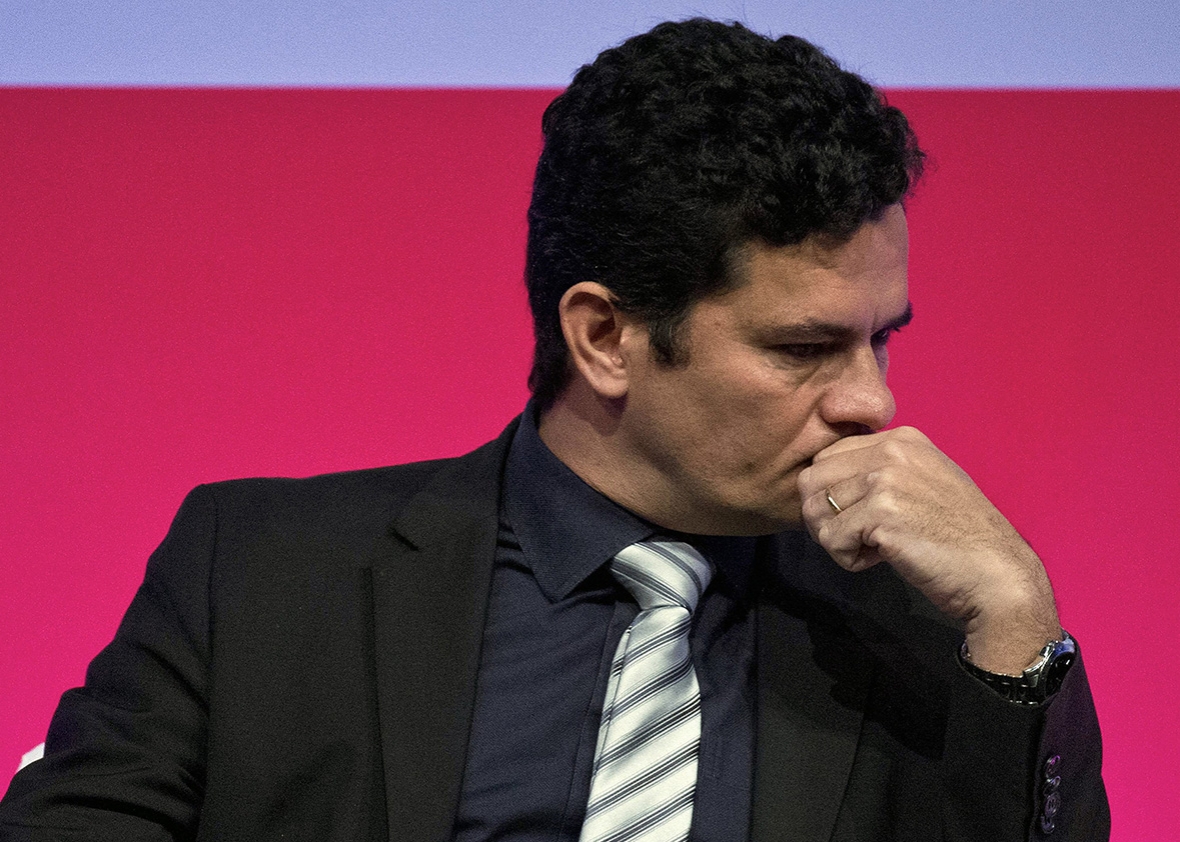
Nelson Almeida/AFP/Getty Images
Though he’s not religious, there’s a messianic quality to Moro’s work. He wrote a paper on the Italian prosecutors who brought down the mob in the legendary operation Mani Pulite (Clean Hands)—the case that pulled apart the corrupt undergirding of Italy’s First Republic. Taking apart the system was perilous work. The prosecutors who masterminded Mani Pulite were assassinated on a Sicilian road, blown to pieces by a half-ton explosive device that shredded their car. Moro has consciously set about transposing their careful method and ambitious scope to a Brazilian context.
Moro understood the success of Mani Pulite was generational—it took a younger, uncorrupted cohort of idealistic prosecutors to bring down the system. He also understood that such a generation had just arrived on the Brazilian scene. With each successive corruption scandal that followed the transition to democracy, the Congress has responded with a rash of politically salving reforms. Over time, these reforms yielded an independent judiciary with meaningful powers. Prosecutorial jobs paid well, too—and they provided a magnet for the best and brightest, often trained in American schools. It’s a generation that came into the workforce in the 1990s, is now entering its professional prime, and is fueled by the righteous possibility that it can achieve the transformational change that eluded technocrats and well-meaning politicians.
As a student of political malfeasance, Moro knew how to leverage a small opening—how to start with bit players, how to secure their cooperation with plea deals. He would slowly ascend the food chain. In 2013, police hauled in a money-launderer called Alberto Youssef as part of a drug investigation. Sitting in his cell, Youssef was eager to unburden himself and perhaps rescue himself from a long sentence. “Guys,” he told his lawyers, “if I speak, the republic is going to fall.”
Youssef worked out of Posto da Torre, a 24-hour gas station in Brasilia, an unlikely front for a monumental scheme. From this locale, he moved $444 million to foreign banks, a set of bribes that flowed to businessmen and politicians from contractors. Posto da Torre was the beating heart of a kickback scheme, straightforward in everything but its scale. Because the gas station once housed a car wash—Lava Jato—prosecutors had the perfectly apposite, perfectly catchy moniker for the Youssef scheme.
The pit stop may have been rinky-dink, but the scheme traced back to the crown jewel of the Brazilian government—the state-owned oil company, Petrobras. Before oil prices crashed, Petrobras was the sixth-largest company in the word; it constituted about 10 percent of the country’s gross domestic product. This might have even been a modest, nascent stage in the company’s history, given the discovery of massive oil fields off the Atlantic coast.
The new oil fields meant a massive expansion for Petrobras: new plants, new servicing facilities. And these presented opportunities for the big, well-connected construction companies. Rather than compete for the business, the companies decided to form a secret cabal. They would maintain a pretense of competition for bids, but they had predetermined the outcome in meetings in São Paulo. The cabal conspired to overcharge Petrobras. Executives at Petrobras were amply rewarded for their participation in the scheme, as were many politicians.
Astonishing sums of money—$3 billion in bribes—flowed in all directions, to all political parties. Only a small handful of politicians refrained from the easy take, and one of them is apparently Dilma Rousseff. But while she never pocketed any of the cash, she served as the chairwoman and then president of Petrobras during the height of the scheme. Given her difficulty trusting others—and her technocratic appetite for micromanagement—it’s hard to imagine that she remained in the dark.
From his perch at the gas station, Youssef could see the entire web of transactions. When he agreed to cooperate with investigators, he couldn’t have provided them with a clearer map to begin building a case. Youssef wrote a list of all the participants in the Petrobras operation. When his lawyer received the list, he gasped. “Are you serious?” When the lawyer recounted the moment to the New York Times, he said, “It was kind of like, in Brazil, we know that corruption is a monster. But we never really see the monster. This was like seeing the monster.” Moro had found the Brazilian analogue to Mani Pulite, and he wouldn’t let go.
Walk into any Rio or São Paulo bookstore and you’ll find Moro’s visage gleaming from the cover of adulatory books, a good reflection of the high esteem with which he is broadly held among a certain segment of the elite. But he has vehement critics, especially from the ranks of the PT. One of their complaints is that he embodies the biases of his social class—that he’s waging a vendetta against the party of the people and especially its still popular figurehead, Lula. The fact that Moro genuflects before the American justice system—and has received training at Harvard Law and from a State Department program—is said to make him inherently suspicious.
Another critique holds that his celebrity and faith in his own virtue have led him to abuse his powers. (Dilma has railed against his use of plea bargains as reminiscent of a dark conspiracy from the 18th century.) There’s certainly reason to worry about the prospects of overreach. This spring, when Lula approached Dilma about obtaining a job in her administration, which would have provided him with immunity from prosecution, Moro quickly leaked a transcript of the call. The call itself contained enough ambiguity for Lula’s minions to complain about Moro railroading the ex-president. Indeed, the Supreme Court reprimanded Moro for extending beyond his permitted reach. One newspaper columnist wrote, “The judge, or SuperMoro as he is being referred to by Brazilians, has reignited the flames of a former Brazilian tradition: lynching.”
To focus on Moro’s aggressive moves against Lula misses the larger truth: Moro has hunted big game. Scions of the most storied families in Brazilian business—Correa, Odebrecht, Esteves—are in jail. Some of them are the oligarchical heads of the construction firms that have long been at the root of corruption. They represent the grimy, parasitic relationship between business and the developmentalist state. For half a century, they were able to plunder the public’s resources with impunity. They elevated corruption into an accepted social norm. That norm may finally be eroding. The Lava Jato investigation has yielded more than 100 arrests. João Moreira Salles marveled, “Corruption we’ve always had. Incompetence we’ve always had. What we’ve never had are plutocrats in jail.”
Though he’s camera shy, Moro has deliberately cultivated the press and public. He views himself as self-consciously overturning an entire corrupt system, which requires stirring the public to care about the problem. He’s also well of aware of the prospects of a counter-revolution. Corrupt politicians won’t quietly submit to a perp walk. They’ll fight a death struggle to preserve themselves and their perks. That’s what happened in Italy, where Silvio Berlusconi quietly undid the work of the prosecutors Moro reveres. So in a sense, Moro’s critics are correct. He’s not just overseeing a series of trials. He’s assuming the stance of a crusader, playing a role far larger than his job description.
* * *
When the Senate votes to confirm Dilma’s removal from office later this summer—at this point, a fait accompli—the verdict will be both entirely deserved and profoundly unjust. On the one hand, there’s no denying she has failed miserably as president—so badly that it’s hard to imagine her governing effectively in the coming months and years. On the other hand, incompetence isn’t the grounds for her removal. The case against her is largely a concoction, drummed up by sinister figures.
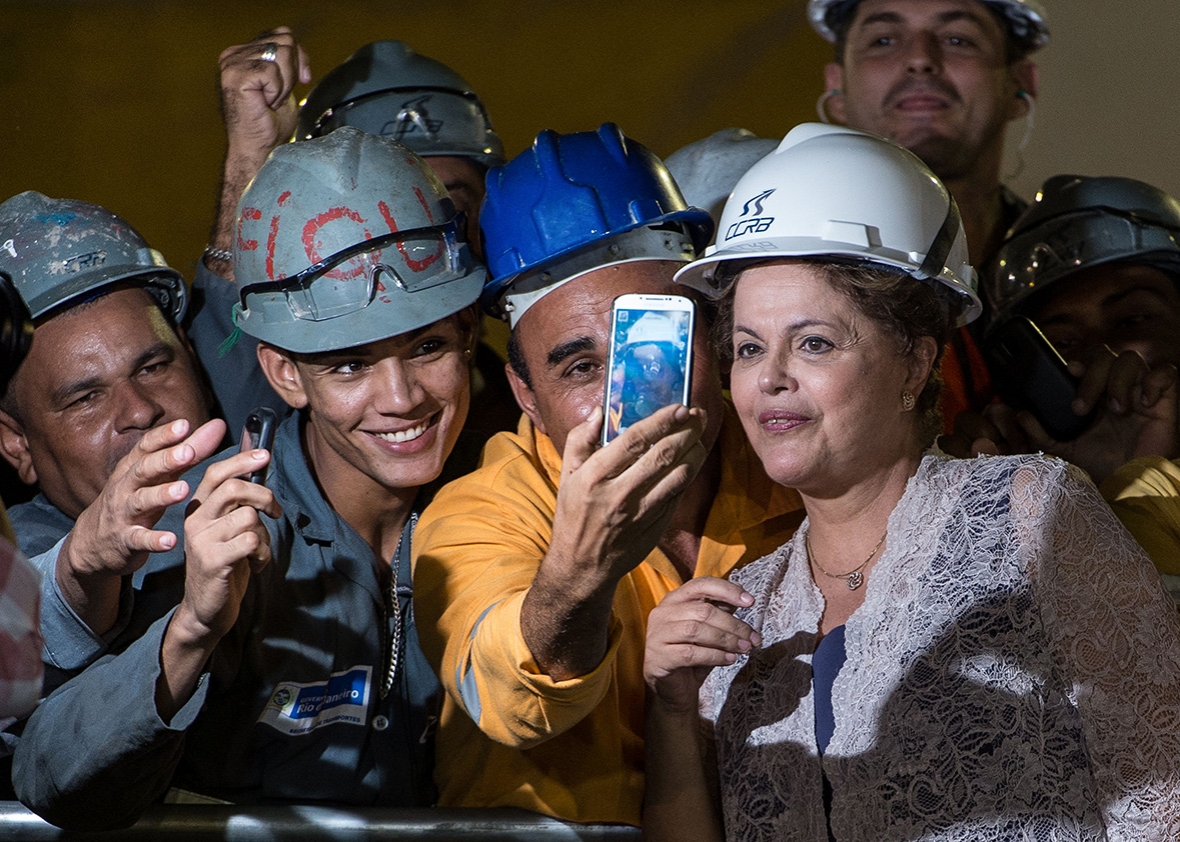
Yasuyoshi Chiba/AFP/Getty Images
When Dilma first came to power in 2011, she basked in Lula’s reflected glory. Her opponents could never imagine that she would fall so badly. The Brazilian system, however, permits endless space for machination, and it provides shelter to some first-class schemers.
Perhaps the biggest structural flaw is that the system has encouraged fragmentation. Over time, the number of political parties has proliferated wildly. There are 28 separate parties in the current Congress. Misguided reforms encouraged this proliferation but so did the logic of game theory. Bargaining has always been a central feature of Brazilian politics—where the resources of the state are used to purchase political support. Politicians came to believe that broad-based political parties are contrary to their own self-interests. Nothing could provide more leverage than holding out for the best deal, by providing the crucial last vote. Many politicians concluded that it is more profitable to be a lone operator than a loyal member of a larger group.
There is a comic quality to the proliferation of parties. The Party of the Brazilian Woman sprouted, though its congressional members were all men—and one of them stood accused of sexually abusing his niece. The signature politician of the new age was a congressman called Grumpy, a clown who successfully ran on the slogan, “It Can’t Get Any Worse.”
Even at the height of its popularity, PT needed partners from this soup of parties. It aligned with the biggest, most transactional of them all, the Brazilian Democratic Movement Party, or PMDB. During the dictatorship, PMDB was the officially sanctioned opposition. It has morphed into an ideologically malleable receptacle for rent-seeking politicians. The Economist’s longtime Latin America correspondent Michael Reid has described the party as a “catchall.” It has no ideological core and therefore draws from across the spectrum. It has, in Reid’s words, one overriding mission: “to command a slice of the state and practice the politics of patronage in the form of government jobs and control over public contracts, and to extract federal money for public works in their districts.” It should come as little surprise that PMDB has more members under investigation for corruption than any other.
One price that the PMDB extracted was the vice presidency. Dilma’s second chair belonged to a constitutional lawyer named Michel Temer, an expert backroom tactician with his own record of scandal. Luiz Eduardo Soares said, “Temer is the father of corruption. If the PT learned corruption, it was from him.” Though Temer operated in the shadows, and speaks in an archaic Portuguese, he had just enough hints of color to attract occasional attention. He published cheesy poetry that alluded to activity in his bedroom. (The title of his volume: Anonymous Intimacy.) His wife—42 years younger than him—had his name tattooed on the back of her neck. Never loyal to Dilma, he seemed curiously well prepared with plans and eager to move quickly as soon as the president’s popularity collapsed.
And Dilma did her best to drive herself into the ground, trusting her own poor political instincts and shutting out advisers at crucial moments. When she ran for re-election in 2014, she understood that victory required a grinding campaign that demolished the character of her opponent and downplayed the looming fiscal crisis in the country. From the stump she decried austerity with passionate vehemence. It worked, but at a cost. Lula quipped: “We won the election. But the following day we lost it.” Two weeks into her second term, she told the country that it faced a grave crisis and required a dose of the painful budget cutting she had decried on the stump. “Dilma deluded the electorate,” argued Eduardo Giannetti.
This wasn’t just a rhetorical turnabout that disillusioned her base. During the campaign, she leaned on the government’s banks to cover budgetary shortfalls. Her critics compared this bit of accounting gimmickry to Enron—and claimed the abuse warranted her impeachment. The fundamental fact of Dilma’s disingenuous accounting is beyond dispute, but the offense was far less egregious than the rants of her opponents suggested. (Glenn Greenwald has a very useful synthesis of all the reasons why her accounting maneuver is hardly a high crime.) No matter the underlying merits of the cause, Dilma was uniquely vulnerable. Her approval had slipped to 8 percent; the country has lost faith in her presidency. All her allies could do was limply cast blame in the other direction. São Paulo Mayor Fernando Haddad—an accomplished academic and creative administrator who Lula once touted as a potential president—told me, “When Dilma was re-elected, she had a chance to fix her mistakes. But she didn’t have the congress. So her enemies started to sabotage her until she failed.”
Impeachment is, of course a political proceeding. What it exposed was the poor quality of the political class. When members of the lower chamber of Congress lined up to justify their votes to impeach, their oratory was roundly damned as incoherent and illogical. Their stated rationale shifted from speech to speech—bizarrely explained as a necessary assault on communism and as a prelude to peace in the Middle East—hardly ever returning to the underlying, very narrow question of accounting fraud.
It would be possible to impeach Dilma for Lava Jato. But that was never going to be the basis for ejecting her. The architects of impeachment were deep in the Petrobras scheme, too. Speaker of the House Eduardo Cunha—an evangelical talk show host from Rio who once suggested the establishment of a Heterosexual Pride Day—used a megachurch to launder bribes. He and his wife owned a Porsche and seven other luxury cars, many of them registered under the name of Jesus.com. (Prosecutors claim he received about $5 million in Lava Jato and millions more from other bribes.) In recent weeks, Temer has been meeting with Cunha to help “save his skin” from prosecution, according to reports.
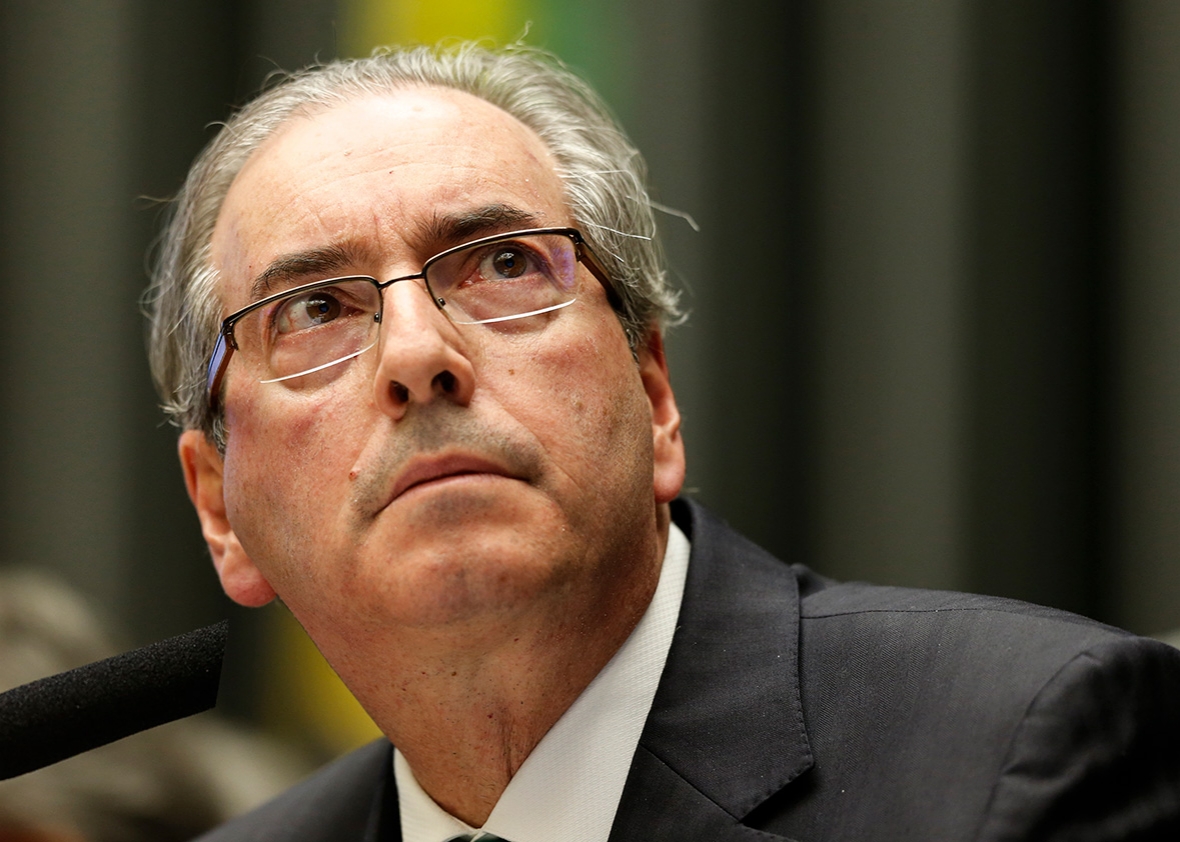
Igo Estrela/Getty Images
Save his skin. That increasingly seems the motive of the entire impeachment proceedings. With Moro threatening to bring down the system, the schemers wanted to make Dilma, rather than their own, the face of corruption. They spelled this out in secretive phones call, transcripts of which somehow leaked. It was a bank-shot strategy, but a plausible one. After they claimed Dilma’s scalp, they hoped that the country would simmer down and shift its attention elsewhere. And if they managed to get the economy back on track, they would suddenly find themselves with the space to quietly gum up the Lava Jato investigation. Their strategy was precisely what Moro feared.
* * *
When I visited Rio, on the eve of the Olympics, there was a sense of looming apocalypse. On my last day in the city, stone-throwing protesters descended on the path of the Olympic torch. The celebratory march, carrying the eternal flame, choked on tear gas fired by police. To cover the costs of the games—which, of course, ran over—the state of Rio de Janeiro borrowed cash from the central government. Everyone can see what will come next. The emergency transfusions to pay police during the games will soon come to end. After the Olympics the police will go on strike, leaving a vacuum in the favelas. Even with the presence of cops, gangs have been returning, first with drugs, then with guns. The gangs are no longer run by wizened veterans of the trade; that older generation of leadership disappeared amid the government’s long “pacification” campaign. The resurgent gangs now feature teenage leaders. The nongovernmental organizations fear these new post-adolescent chieftains will be less tempered and less prudent with their arsenals.
But the public’s understandable despair isn’t wholly shared by the experts I spoke with. Stepping back, they saw unlikely causes for hope. Impeachment revealed the worst about Brazilian democracy—and the worst wasn’t so terrible. There’s no talk of returning to dictatorship, no real fear of a Hugo Chávez–like figure clouding the sky. Impeachment was a poor showing of democracy, but it was still democracy. Even with all the budgetary turmoil, Bolsa Família remains firmly ensconced. Austerity will whack the poor, yet Lula’s evolution of Brazilian social democracy won’t reverse course. Most important, the Petrobras scandal is so spectacular that its grasp on the popular imagination doesn’t seem to be slipping. Indeed, Temer’s impeachment gambit has yet to slow the Moro investigation. Brazil has a once-in-a-generation chance to untether its politics from its debilitating state of codependence with the big firms. Hosting the Olympics was never going to bring Brazil the national greatness Lula advertised. Freeing its democracy and economy from the plague of corruption could.
